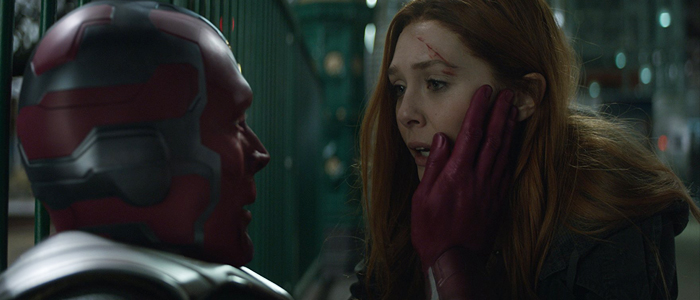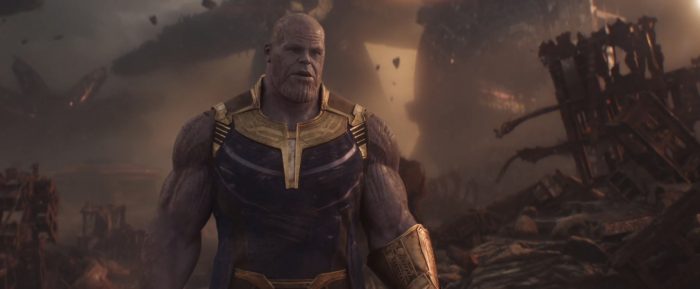‘Avengers: Infinity War’ is About Emotional Terrorism
From the very beginning, the Marvel Cinematic Universe has used terrorism as a plot device. This was always a cinematic world meant to reflect our own, and in the wake of 9/11, terror attacks were – and remain – a very real concern. The Iron Man franchise explicitly includes terrorist acts as plot points – including the truck bombing in the first film‘s opening scene, the inciting incident that leads Tony Stark to become Iron Man in the first place.
But 10 years later, Avengers: Infinity War isn’t as concerned with traditional acts of terror. Instead, it concentrates much more on what I’ll call “emotional terrorism,” forcing its characters to make incredibly difficult choices in which the consequences of their decisions directly involve the fate of someone they love.
Terrorism has long been a mainstay of the MCU, and while acts of terror (bombings, etc.) unquestionably carry tremendous emotional consequences, Infinity War largely avoids that imagery and instead builds on the MCU’s own established history, transitioning from threats of an existential nature to ones that are far more personal.
“I started by writing the names of each of the characters and thinking, ‘what’s the hardest thing they could be faced with?'” That’s Rian Johnson talking about writing Star Wars: The Last Jedi, but it just as easily could have been Infinity War writers Christopher Markus and Stephen McFeely talking about their approach here. This film has far more characters to juggle, and while a handful are admittedly cast aside with barely more than a line or two, the ones the film does concentrate on are put through the wringer – and not just the heroes, but the film’s villain, too.
Major spoilers for Infinity War lie ahead, so turn back now if you haven’t seen the film yet.
Loki and Thor
The first of the movie’s tough decisions falls on Loki (Tom Hiddleston), who watches his brother Thor (Chris Hemsworth) get tortured by Thanos (Josh Brolin) in the film’s opening scene. Thanos offers Loki a choice: watch his brother die, or give up the Space Stone. Loki puts on a tough face before ultimately giving in, producing the Tesseract (which he swiped from Odin’s vault at the end of Thor: Ragnarok) and handing it over. Ever the trickster, Loki also tries to kill Thanos, but the Mad Titan is one step ahead and crushes the life out of Loki for good as a trapped Thor watches in horror.
Quill and Gamora
This is the first of three instances involving Gamora (Zoe Saldana), Thanos’ adopted daughter who was trained from a young age to become the most dangerous woman in the galaxy. Early in the movie, Gamora convinces Peter Quill (Chris Pratt) to promise to kill her in the event that Thanos captures her, because she’s the only person who knows the location of the Soul Stone. When that situation inevitably arises, Quill points his gun at Gamora’s head, the two proclaim their love for each other, and Quill – teary-eyed and almost shaking – pulls the trigger. He made the hard decision and was prepared to live with the consequences, because it would have saved the galaxy. But Thanos uses the Reality Stone to turn the gun’s laser blast into a bunch of bubbles, viciously toying with his prey and robbing Quill of the small sliver of satisfaction that would have come with the sacrifice of the woman he loved the most.
Gamora and Nebula
After Thanos captures Gamora, he reveals that he’s also captured her sister Nebula (Karen Gillan). Brutally torturing Nebula before Gamora’s eyes is enough to make Gamora reluctantly give up the location of the Soul Stone, which proves to be a fateful error in more ways than one.
Gamora and Nebula’s reconciliation in Guardians of the Galaxy Vol. 2 laid the groundwork for this scene and gives it its emotional crux. So much of this film relies on relationships established in other movies, and I’ve seen some people knock Infinity War a little for that. But this is the 19th film in the Marvel Cinematic Universe – it was never meant to be viewed as a standalone piece. Yes, this is a giant corporate product, but at the same time, you have to stand back and admire it for banking on the fact that its audience will remember plot points that happened multiple movies ago. At least it’s not treating its audience like idiots.
Thanos and Gamora
Speaking of emotional cruxes, one of the most important moments in this film comes during the scene in which Thanos and Gamora visit the planet hiding the Soul Stone, where Red Skull (!) gave Thanos the ultimate test: after cruelly forcing people to choose how their loved ones die, now it’s his turn to sacrifice something he loves. Gamora, laughing bitterly at this twist of fate, slowly realizes too late that she is the only person the Mad Titan ever cared about, and while crying, he hurls her off a cliff to her death. It’s a devastating ending to a beloved character, an act that haunts both Thanos and Peter Quill for the rest of the film.
Scarlet Witch and Vision
While the Thanos/Gamora scene is the most impactful, the most surprisingly emotional is between Vision (Paul Bettany) and Scarlet Witch/Wanda Maximoff (Elizabeth Olsen). I honestly didn’t care much about these characters before, but Markus and McFeely finally gave Wanda some real weight here – and despite the fact that most of Wanda and Vision’s love story happens off screen, Olsen’s performance was so moving that it made me feel like I was invested in their relationship.
In Wakanda, Scarlet Witch is forced to kill the man (uh, android?) she loves in order to prevent Thanos from getting the Mind Stone that’s implanted in Vision’s forehead. And in one of his most malicious moves in the entire film, Thanos actually lets her kill Vision. Wanda, like Quill, was willing to send her loved one to his grave before letting Thanos wipe out half of the universe, and she made the selfless (but personally crushing) choice. But Thanos used the Time Stone to snatch that choice away from her, reversing her selfless act and yanking the Mind Stone from Vision anyway. It’s the most weaponized case of emotional terrorism in a film practically overflowing with them.
While the emotional stakes aren’t quite as high, there’s also the instance of Doctor Strange (Benedict Cumberbatch) and Iron Man (Robert Downey Jr.), two characters who didn’t even know each other before this film began. After Stark is impaled, Strange tells Thanos to spare Stark’s life and hands over the Time Stone, the one thing he’s made clear that he would never give up. But Strange has seen millions of possible futures, and he knows that The Avengers only win in one of them. He knew damn well that he and half the team would be turned to dust, and we have to assume he knows that some of them will be resurrected before all is said and done. Giving up the Stone was the only way to clear the path for their eventual return, and this coupled with the beacon of hope provided by the movie’s post-credits scene are basically the only indicators that this fight against Thanos isn’t over just yet.
Avengers: Infinity War is in theaters now.
The post ‘Avengers: Infinity War’ is About Emotional Terrorism appeared first on /Film.
from /Film https://ift.tt/2jjLsLT






No comments: